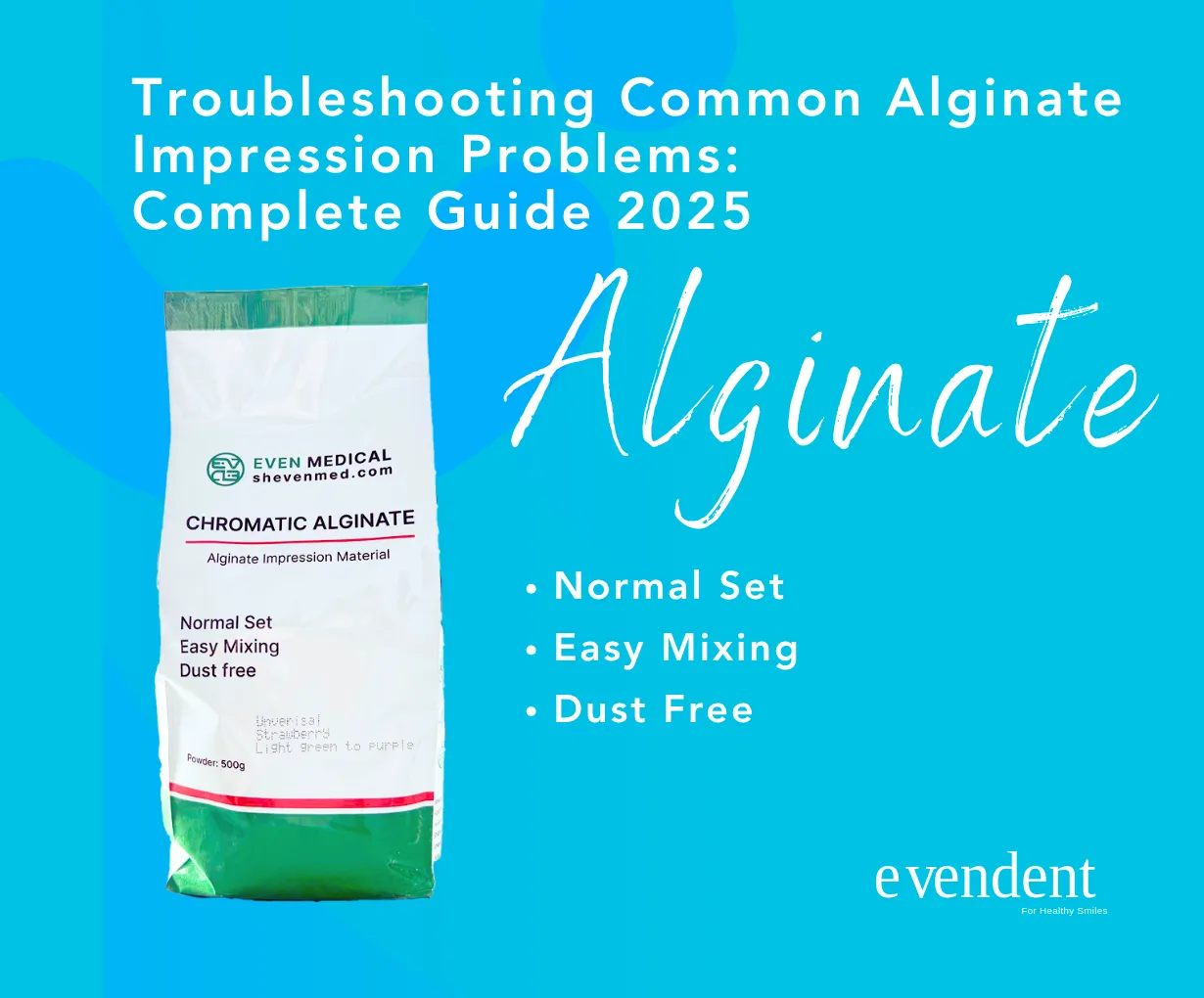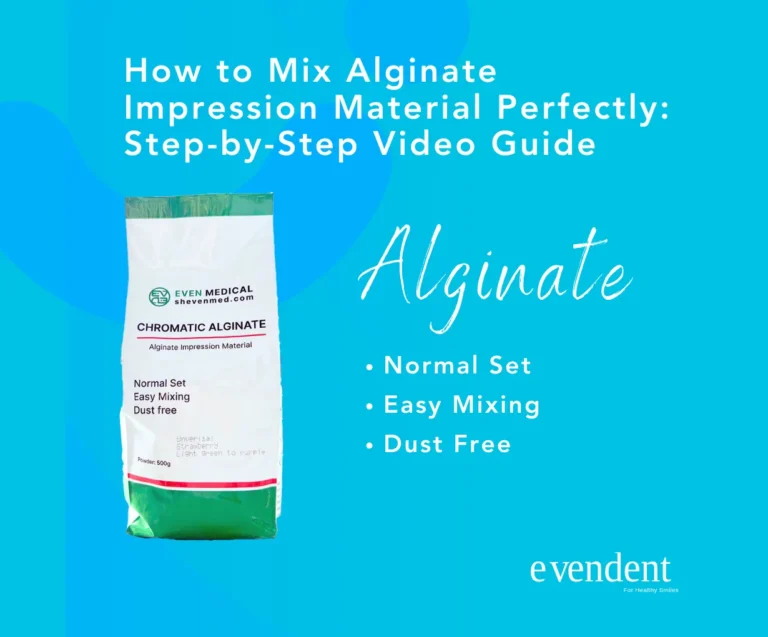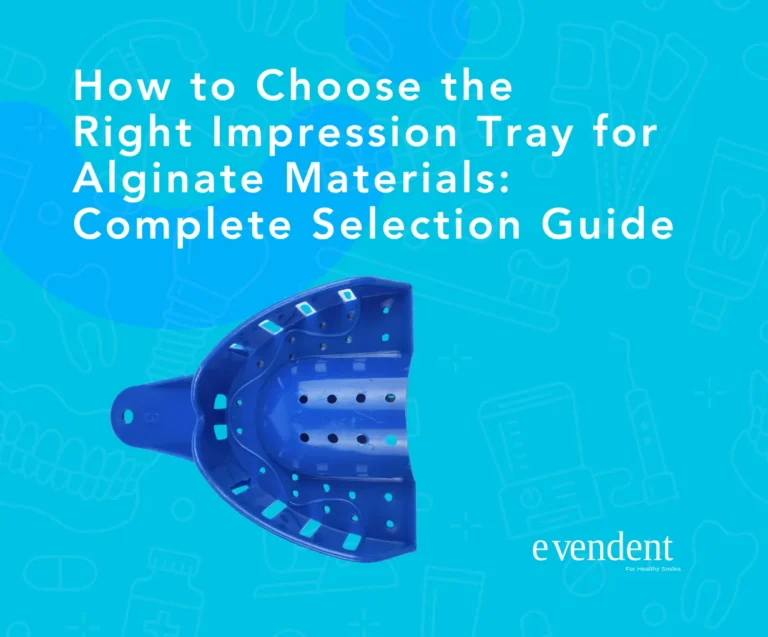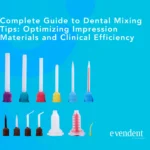Alginate impression problems can significantly impact your practice’s efficiency and patient satisfaction. From premature setting to poor detail reproduction, understanding how to quickly diagnose and resolve these issues is crucial for maintaining high-quality dental care. This comprehensive troubleshooting guide provides step-by-step solutions for the most common alginate impression problems, helping you achieve consistent results with modern chromatic alginate materials.
Understanding Alginate Impression Failure Patterns
Modern alginate impression materials like EvenDent’s chromatic series have revolutionized dental impressions with 20μm particle fineness and visual timing indicators. However, even advanced materials can fail without proper technique and troubleshooting knowledge.

Most Common Alginate Problems
Setting Time Issues (40% of failures)
- Premature setting (under 3 minutes)
- Delayed setting (over 4 minutes)
- Inconsistent setting patterns
Detail Reproduction Problems (30% of failures)
- Poor surface detail capture
- Missing margin definition
- Bubble formation in impressions
Material Separation Issues (20% of failures)
- Alginate pulling away from tray
- Partial impression loss during removal
- Distorted impression areas
Handling and Storage Problems (10% of failures)
- Dimensional instability
- Material degradation
- Storage-related failures
Systematic Problem Diagnosis Approach
Quick Assessment Protocol
Step 1: Visual Inspection
- Check for complete impression coverage
- Identify areas of poor detail reproduction
- Look for air bubbles or voids
- Assess overall impression integrity
Step 2: Timeline Analysis
- Review mixing time (should be 30 seconds)
- Verify working time utilization (≥1’30”)
- Confirm intraoral setting time (1’00”)
- Check total procedure time (3’00”)
Step 3: Material Evaluation
- Examine alginate consistency and color
- Check for proper chromatic color change
- Assess material freshness and storage
- Verify mixing ratio accuracy (10g:22mL)
Problem #1: Chromatic Indicator Not Changing
Symptoms
- Color remains unchanged after expected setting time
- Material stays in paste form beyond 3 minutes
- No visual confirmation of setting stages
- Uncertain timing for impression removal
Root Causes Analysis
Incorrect Mixing Ratio (60% of cases)
- Too much water dilutes setting reaction
- Insufficient powder reduces cross-linking
- Measurement errors in 10g:22mL ratio
Temperature Issues (25% of cases)
- Cold water slows chemical reaction
- Hot water accelerates too rapidly
- Ambient temperature below 20°C
Material Degradation (15% of cases)
- Expired alginate powder
- Moisture contamination during storage
- Improper storage conditions
Step-by-Step Solutions
Solution 1: Verify Mixing Ratio
- Use calibrated measuring devices for exact 10g:22mL ratio
- Weigh powder on digital scale for accuracy
- Measure water with graduated cylinder
- Always add powder to water, never reverse
Solution 2: Temperature Control
- Use room temperature water (23°C/73°F)
- Warm cold water gradually to proper temperature
- Avoid hot water that accelerates setting
- Monitor ambient room temperature
Solution 3: Material Quality Check
- Verify expiration date on packaging
- Check storage conditions (below 25°C, dry)
- Inspect powder for clumping or discoloration
- Replace aged or contaminated materials
Prevention Strategies
- Store EvenDent alginate in sealed containers below 25°C
- Use calibrated measuring equipment daily
- Train staff on proper mixing protocols
- Rotate stock using first-in-first-out system
Problem #2: Premature Setting (Under 3 Minutes)
Symptoms
- Material sets during tray loading
- Insufficient working time for positioning
- Hard, inflexible impression before removal
- Rushed procedure causing patient discomfort
Root Causes Analysis
Environmental Factors (50% of cases)
- High ambient temperature (above 25°C)
- Warm water used for mixing
- High humidity conditions
- Direct sunlight exposure
Material Contamination (30% of cases)
- Contaminated measuring equipment
- Cross-contamination from previous batches
- Salt residue accelerating setting
Technique Issues (20% of cases)
- Vigorous mixing generating heat
- Small batch size setting faster
- Accelerated powder formulation
Comprehensive Solutions
Solution 1: Environmental Control
- Cool mixing area to 23°C optimal temperature
- Use room temperature or slightly cool water
- Control humidity levels in operatory
- Avoid direct heat sources during mixing
Solution 2: Equipment Maintenance
- Clean mixing bowls thoroughly between uses
- Rinse spatulas with distilled water
- Use separate equipment for different materials
- Replace worn measuring devices
Solution 3: Technique Optimization
- Mix with steady, controlled motion
- Avoid excessive vigorous mixing
- Use standard batch sizes (10g powder)
- Work in cooler environment when possible
Advanced Prevention
- Install temperature monitoring in mixing areas
- Establish standard operating procedures for environmental control
- Train staff on seasonal adjustments for summer heat
- Consider EvenDent’s stable color options (Pink, Purple, Orange) for challenging conditions
Problem #3: Poor Detail Reproduction
Symptoms
- Blurred margin lines in impressions
- Missing surface texture details
- Inadequate capture of preparation edges
- Insufficient detail for prosthetic work
Detailed Diagnostic Process
Mixing Quality Assessment (40% of issues)
- Lumpy or uneven consistency
- Air bubble incorporation
- Insufficient mixing time (under 30 seconds)
- Improper powder dispersion
Tray Loading Problems (35% of issues)
- Inadequate alginate thickness (under 3mm)
- Uneven material distribution
- Air entrapment during loading
- Insufficient material quantity
Impression Technique Issues (25% of issues)
- Premature removal before complete setting
- Patient movement during setting
- Inadequate seating pressure
- Moisture contamination
Systematic Solutions
Solution 1: Optimize Mixing Technique
- Mix vigorously for full 30 seconds using figure-8 motion
- Ensure homogeneous, lump-free consistency
- Use mechanical mixer when available for large batches
- Monitor chromatic color change throughout mixing
Solution 2: Perfect Tray Loading
- Load posterior areas first to prevent air entrapment
- Ensure 3-4mm uniform alginate thickness
- Smooth material surface before insertion
- Use adequate material quantity for complete coverage
Solution 3: Refine Impression Technique
- Insert tray steadily without bouncing
- Maintain consistent pressure during setting
- Wait for complete chromatic color change
- Remove with steady, controlled motion
Quality Enhancement Tips
- Choose appropriate EvenDent precision level:
- E50001 Universal: General diagnostic work
- E50002 High Precision: Crown and bridge cases
- E50003 Super High Precision: Critical accuracy requirements
- Use perforated trays for mechanical retention
- Apply light tray adhesive for smooth surfaces
Problem #4: Material Separation from Tray
Symptoms
- Alginate pulls away during removal
- Partial impression loss
- Distorted sections of impression
- Incomplete tray coverage after removal
Comprehensive Analysis
Tray Preparation Issues (45% of cases)
- Non-perforated trays without adhesive
- Contaminated tray surfaces
- Improper tray size selection
- Inadequate mechanical retention
Material Properties (35% of cases)
- Low tear strength alginate
- Inadequate elastic recovery
- Over-extended working time
- Material degradation
Technique Factors (20% of cases)
- Forceful removal technique
- Premature impression removal
- Inadequate setting time
- Patient movement during procedure
Professional Solutions
Solution 1: Tray Optimization
- Use perforated trays for mechanical retention
- Apply appropriate tray adhesive to smooth surfaces
- Ensure proper tray size with 3-4mm clearance
- Clean and dry tray surfaces before use
Solution 2: Material Selection
- Choose EvenDent alginate with superior tear strength:
- Universal Type: >0.38N/mm tear strength
- High Precision: >0.4N/mm tear strength
- Super High Precision: >0.48N/mm tear strength
- Verify proper elastic recovery rates (97-98%)
- Use fresh material within expiration dates
Solution 3: Technique Refinement
- Allow complete 3-minute setting time
- Remove with steady, perpendicular motion
- Support impression during removal
- Use finger pressure to guide separation

Advanced Retention Strategies
- Combine perforated trays with light adhesive coating
- Use rim-lock trays for critical cases
- Consider custom tray fabrication for difficult anatomies
- Train staff on proper removal techniques
Problem #5: Inconsistent Setting Patterns
Symptoms
- Partial areas remain soft while others are set
- Uneven color change across impression
- Different setting times in same batch
- Unreliable timing patterns
Multi-Factor Analysis
Mixing Inconsistencies (50% of cases)
- Uneven powder distribution
- Incomplete water incorporation
- Temperature variations in mixing bowl
- Inadequate mixing time or technique
Environmental Variables (30% of cases)
- Temperature gradients in operatory
- Humidity fluctuations
- Air circulation patterns
- Proximity to heat sources
Material Factors (20% of cases)
- Powder age variations
- Storage condition differences
- Contamination from multiple sources
- Batch-to-batch variations
Professional Resolution Strategies
Solution 1: Standardize Mixing Protocol
- Use consistent mixing technique with 30-second duration
- Employ figure-8 motion for uniform distribution
- Ensure complete powder incorporation
- Monitor temperature consistency
Solution 2: Environmental Standardization
- Maintain stable operatory temperature (23°C ± 2°C)
- Control humidity levels between 40-60%
- Eliminate direct heat or cold sources
- Use consistent water temperature
Solution 3: Material Quality Control
- Use single-batch powder for each impression
- Store materials in consistent conditions
- Rotate stock regularly using FIFO system
- Monitor material performance trends
Advanced Troubleshooting: Digital Integration
Hybrid Workflow Optimization
Digital Verification Protocol
- Take conventional alginate impression using proper technique
- Scan impression immediately for digital verification
- Compare accuracy against clinical requirements
- Identify specific areas needing improvement
Quality Assurance Integration
- Use digital scanning to verify alginate accuracy
- Document problem patterns for staff training
- Create digital records of successful techniques
- Establish benchmark standards for comparison
Prevention Through Staff Training
Comprehensive Training Protocol
Initial Training (8 hours)
- Material science fundamentals
- Proper mixing techniques demonstration
- Hands-on practice with chromatic timing
- Troubleshooting scenario simulations
Ongoing Education (Monthly)
- Review common problems and solutions
- Practice difficult case scenarios
- Update on new material technologies
- Peer-to-peer technique sharing
Quality Monitoring
- Track remake rates by operator
- Document problem patterns
- Provide targeted coaching
- Recognize excellence in technique
Training Resources
- EvenDent technical support: +86-180-1638-1172
- Online training materials and videos
- Hands-on workshops and demonstrations
- Clinical technique consultations
Cost Impact of Alginate Problems
Financial Analysis of Impression Failures
Direct Costs per Failed Impression
- Material waste: $0.40-0.70 per alginate impression
- Chair time loss: $25-50 per 15-minute remake
- Staff time overhead: $10-20 per incident
- Patient satisfaction impact: Immeasurable long-term cost
Annual Cost Projections
- High-volume practice (50+ impressions/day): $5,000-15,000 in preventable losses
- Medium practice (20-40 impressions/day): $2,000-8,000 in preventable losses
- Specialty practice (10-20 impressions/day): $1,000-4,000 in preventable losses
ROI of Quality Materials and Training
- Premium alginate materials: 20-30% reduction in remake rates
- Comprehensive staff training: 40-50% reduction in technique-related failures
- Environmental controls: 15-25% improvement in consistency
- Total potential savings: 50-70% reduction in alginate-related costs
Technology-Enhanced Problem Prevention
Modern Alginate Advantages
EvenDent Chromatic Technology Benefits
- Visual timing confirmation eliminates guesswork
- Color-change indicators prevent premature removal
- Multiple color options for different preferences
- Consistent performance across all precision levels
Advanced Material Properties
- 20μm particle fineness for superior detail reproduction
- Dust-free formula reduces workplace contamination
- Enhanced tear strength (0.38-0.48N/mm range)
- Superior elastic recovery (97-98%) minimizes distortion
Smart Workflow Integration
- Use chromatic timing for consistent results
- Implement digital verification protocols
- Document successful techniques for replication
- Create standard operating procedures based on proven methods
Quality Assurance Protocols
Daily Quality Checks
Material Preparation
- Verify storage temperatures below 25°C
- Check expiration dates on all products
- Inspect powder for clumping or discoloration
- Calibrate measuring equipment accuracy
Process Monitoring
- Document mixing ratios and times
- Record setting times and temperatures
- Track remake rates by operator
- Monitor patient feedback patterns
Equipment Maintenance
- Clean mixing bowls thoroughly
- Inspect tray condition and retention
- Verify adhesive effectiveness
- Replace worn measuring tools
Weekly Performance Review
- Analyze remake patterns and causes
- Review training needs for staff
- Update procedures based on outcomes
- Communicate with EvenDent technical support for guidance
Emergency Problem Resolution
Rapid Response Protocol
When Impression Fails During Procedure
- Immediate Assessment : Quickly identify the failure cause
- Patient Communication : Explain need for retake professionally
- Rapid Setup : Prepare new materials with corrected technique
- Quality Verification : Ensure second impression meets standards
Same-Day Solutions
- Keep backup materials at optimal temperature
- Have multiple tray sizes readily available
- Maintain emergency adhesive supplies
- Train team in rapid problem identification
Critical Case Management
- Maintain premium material stock for urgent cases
- Have experienced operator available for difficult impressions
- Establish relationships with laboratory for rapid turnaround
- Document lessons learned for future prevention
Conclusion: Mastering Alginate Impression Success
Troubleshooting alginate impression problems requires systematic approach, quality materials, and continuous improvement. By understanding common failure patterns and implementing proven solutions, dental practices can achieve 95%+ success rates with alginate impressions.
Key Success Factors:
- Use high-quality chromatic alginate materials (EvenDent E50001-E50003)
- Implement standardized mixing and handling protocols
- Maintain optimal environmental conditions
- Provide comprehensive staff training and ongoing education
- Monitor quality metrics and implement improvements
Remember : Prevention is always more cost-effective than remediation. Invest in quality materials, proper training, and systematic approaches to minimize alginate impression problems and maximize patient satisfaction.
Get Expert Support for Alginate Impression Success
Struggling with persistent alginate impression problems? Our technical specialists are ready to help you achieve consistent, high-quality results with proven troubleshooting solutions.
Why Choose EvenDent Chromatic Alginate Materials?
✅ Visual Timing Confirmation – Chromatic color-change technology eliminates guesswork and reduces timing-related failures
✅ Superior Problem Prevention – 20μm particle fineness and 97-98% elastic recovery minimize common impression issues
✅ Three Precision Levels – Choose the right material for your specific needs:
- E50001 Universal Type : General diagnostic work with reliable performance
- E50002 High Precision Type : Crown and bridge cases requiring enhanced accuracy
- E50003 Super High Precision Type : Critical cases demanding maximum precision
✅ Comprehensive Technical Support – Expert troubleshooting guidance and clinical consultation
✅ Proven Track Record – Trusted by dental professionals worldwide for consistent results
Immediate Problem-Solving Resources
📞 Clinical Support Hotline : +86-180-1638-1172
🟢 WhatsApp Technical Support : +86-180-1638-1172
🌐 Expert Consultation : evendent.com
📧 Detailed Troubleshooting Guide : Request comprehensive technical documentation
📦 Sample Materials : Try our chromatic alginate technology risk-free
Professional Training Available
- On-site technique workshops for your entire team
- Digital troubleshooting resources and video guides
- Monthly webinars on advanced alginate techniques
- One-on-one consultations for persistent problems
Don’t let alginate impression problems compromise your practice quality or profitability. Contact EvenDent today for expert solutions and premium materials that deliver consistent results.





